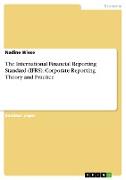- Start
- The International Financial Reporting Standard (IFRS). Corporate Reporting Theory and Practice
The International Financial Reporting Standard (IFRS). Corporate Reporting Theory and Practice
Angebote / Angebote:
Seminar paper from the year 2008 in the subject Business economics - Accounting and Taxes, grade: 1, 0, University of the West of England, Bristol (Bristol Business School), course: Corporate Reporting Theory and Practice, language: English, abstract: In this report the International Financial Reporting Standard (IFRS) for Small and Medium-sized Entities (SMEs) is presented. It identifies that this new standard is required due to mainly smaller, non-listed companies prevailing. These entities currently use diverse national accounting standards and thus are not comparable. However, because of SMEs' differing activities and stakeholders, existing IFRSs would not be appropriate so new standards are needed.The IFRSs for SMEs are based on initial, full IFRSs but were reduced, simplified and adjusted to reduce the reporting burden that many small companies would suffer. All companies addressed are not publicly accountable, provide general purpose statements and approximately contain 50 employees. Which firms in detail will apply to these new standards is finalised by national jurisdictions. Nonetheless, there can be found some disadvantages. E.g. immense simplifications can result in insufficiently explained standards that can hardly be employed adequately.Furthermore, four accounting events are revealed: goodwill impairment, cost method for associates, finance leases and research and development expenditures. All these show up differences compared to full IFRSs. The preparation of financial reports is facilitated and user interests are taken into consideration. However, alternatives can be suggested that perhaps are more appropriate for SMEs. Finally, it is concluded that the IFRS for SMEs are well developed including advantageous adjustments that try to satisfy SMEs' as well as their reports users' needs. However, it becomes apparent that some revisions could be necessary to consequently truthfully allow the vast amount of smaller companies become globally comparable.
Folgt in ca. 10 Arbeitstagen
